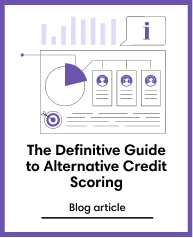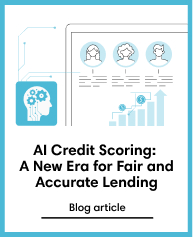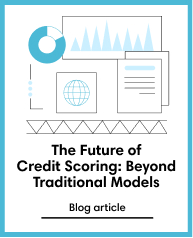Credit Scoring
Jan 5, 2022
How management executives (CFOs) can harness alternative scoring
Subscribe to our newsletter
Management executives such as Chief Financial Officers(CFOs) are responsible for making sure their organisations do not take on any unnecessary risks. For many businesses such as lending institutions, this primarily means sharpening credit risk management and staying away from issuing loans that have a big chance of defaulting.
The task of improving credit risk management is no easy feat. So far, conventional risk management in general involves creating a small central risk function responsible for assessing risks, cascading concerns to upper management, and then waiting for a recommended plan of action. While this approach has generally worked in the past, its efficiency is hampered by bureaucracy.
As loan applications steadily increase in the wake of the pandemic (with people needing to borrow to rebuild their lives and businesses), CFOs and other business leaders need a better way to determine which loans they can afford to dole out.
A new solution for assessing risk
Fortunately, for CFOs and other risk assessors, alternative data has emerged as another way of assessing risk.
While traditional data sources like financial statements, bank statements, and sales figures are still valuable, they fail to give a complete picture (especially if the loan applicant is one of the many millions around the world still unbanked or lacking in an extensive credit history). In contrast, alternative data includes data sourced from non-traditional sources like web traffic, mobile devices, satellites, public records, and more to form a more accurate assessment of the potential borrower.
Alternative data paves the way for alternative credit scoring. Consumer-permissioned alternative data can give consumers an entry point into building credit and empower consumers to take back control of their credit, while also enabling lending institutions to expand their reach.
CFOs need to pay attention
There has been a rise in people turning to nonbank alternative lenders for short-term loans and working capital. Small businesses especially report favouring alternative lenders, reporting that applying to conventional banks often takes weeks for approval—if that comes at all. Thus, alternative lenders emerge as a better option than alternative, which is more often receiving no cash at all.
Even as far back as 2015, alternative lenders have outpaced traditional banks in terms of loan approval. According to one report, large banks approved 22% of small-business funding requests in June 2015, while small banks approved 49%.
CFOs must harness alternative scoring to keep their institutions relevant in the midst of increasing competition. Refusing to consider incorporating alternative data or alternative scoring could mean putting a cap on the number of borrowers their organisation can serve and incapacitating their own ability for credit risk management.
How CFOs can harness alternative scoring
It is clear now that the way for management to harness alternative scoring is to incorporate alternative data into any risk management models.
One possible solution is to enlist the help of an outside fintech company specialising in alternative scoring. Credolab uses embedded scoring technology to help lenders automate existing credit scoring models to generate advanced, predictive, and accurate scores for their customers that can compete in the new era of fintech credit scoring.
Credolab offers a wide range of solutions such as its Credometer tool, which can be used even before incorporating any alternative scoring to gauge the accuracy and performance of lenders’ pre-existing scoring processes. The fintech company even offers a credit scoring SDK (software development kit) that can easily incorporate alternative scoring into any pre-existing scoring model, to facilitate a smoother transition. With these solutions, the pains of transitioning to new fintech credit scoring are eased.
CFOs have a responsibility to improve their organisation’s risk management capabilities in any way they can. Whether it is studying and learning from the models of alternative lenders or working with a solutions provider to harness alternative data, it is clear that CFOs who realise the importance of alternative scoring will come out on top.
To get the full insights into how the CFO and finance team can free working capital to grow the business using alternative scoring, download our latest ebook here.





